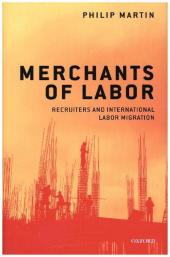 Neuerscheinungen 2017Stand: 2020-02-01 |
Schnellsuche
ISBN/Stichwort/Autor
|
Herderstraße 10
10625 Berlin
Tel.: 030 315 714 16
Fax 030 315 714 14
info@buchspektrum.de |

Philip Martin
Merchants of Labor
Recruiters and International Labor Migration
2017. 240 p. 240 mm
Verlag/Jahr: OXFORD UNIVERSITY PRESS; OUP OXFORD 2017
ISBN: 0-19-880802-X (019880802X)
Neue ISBN: 978-0-19-880802-2 (9780198808022)
Preis und Lieferzeit: Bitte klicken
Some 10 million migrant workers cross national borders each year. This book examines the businesses that move low-skilled workers, explaining recruitment, remuneration and retention, and showing how national borders increase recruitment costs. Tackling the often murky world of labor migration, it fills an important void in this fast-growing field.
Some 10 million migrant workers cross national borders each year and, if they pay an average $1,000 to recruiters, moving workers over borders is a $10 billion a year business. Merchants of Labor examines the businesses that move low-skilled workers over national borders, asking how much they collect from migrant workers and what can be done to reduce worker-paid migration costs.
For-profit recruiters are likely to be an enduring feature of international labor migration, which makes developing tools to improve the management of their activities ever more crucial. The UN recognized in the Sustainable Development Goals for 2030 the need to measure what workers pay to get jobs in other countries with the goal of reducing worker-paid costs so that workers and their families can benefit more from international labor migration.
Using cost data from over 3,000 workers, Merchants of Labor examines the often murky world of labor brokers, travel agents, and others who move low-skilled workers from one country to another in order to explore lower worker-paid migration costs. It explains the three core functions of labor markets- recruitment, remuneration, and retention- and shows how national borders increase recruitment costs. New data on what workers pay to get jobs in other countries are presented, and
incentives to complement enforcement are explored as a way to induce recruiters to protect migrant workers.
Philip Martin is Professor of Agricultural and Resource Economics at the University of California, Davis. He edits Rural Migration News, has served on several federal commissions, and testifies frequently before Congress. He is an award-winning author who works for UN agencies around the world on labor and migration issues.


